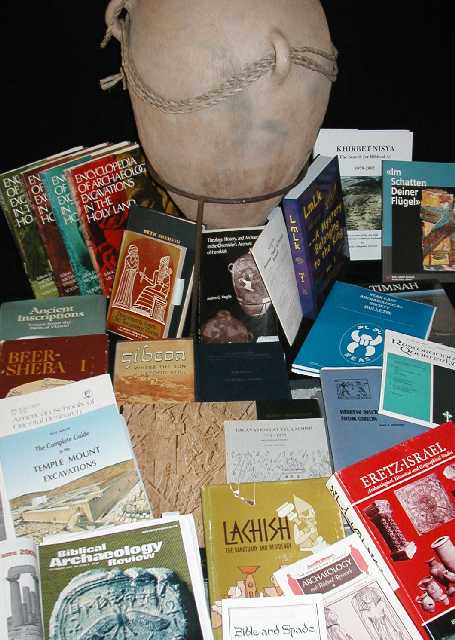LMLK Home
Biblical Accounts
NonBiblical Accounts
Theories
HBRN
MMST
SUKE
ZYF
Generic
x (cannot classify)
2-Top
2-Divided
2-Undivided
4-Cursory
4-Lapidarist
Jars
Personal Seals
Incisions
Paleography
Typologies
Corpus
Stratigraphy
Geography
Displays
Publications
Credits
Updates

|
Bibliography (Total Listings: 334)
For your convenience, 4 versions of the bibliography are provided below:
Nobody's pirFekt, so click here to see errata.

Milestones
- 1870 Charles Warren publishes the first excavated LMLK handles (ZP, circles, plus mark, & MMST (read only as "ST")--all 2-winged specimens).
- 1874 C. Clermont-Ganneau publishes the first HBRN handle (unidentified until 1900).
- 1881 J. Baker Greene proposes that the inscriptions name potters.
- 1893 A.H. Sayce identifies the first SUKE inscription (from the original excavation) & proposes that the inscriptions name local deities.
- 1898-1900 Over 70 LMLK handles are excavated from 4 Shephelah tells (Gath, Azekah, Moresheth-Gath, Mareshah).
- 1899 F.J. Bliss publishes the first HBRN handle properly identified (found at Azekah), which was also the first 4-winged specimen; he proposes that the inscriptions name places.
- 1899 C. Clermont-Ganneau identifies the 4-winged icon as a scarab, & proposes that the jars were used for military supplies build-up.
- 1900 F.J. Bliss publishes the first complete MMST inscription & forms a typology of 11 classes.
- 1900 C. Clermont-Ganneau proposes that the inscriptions name administrative districts.
- 1901 Fritz Hommel proposes that MMST = Mampsis (Kurnub).
- 1902 R.A.S. Macalister publishes the first LMLK paleography chart.
- 1911 H. Vincent publishes the first top-register impression, M2T from Jerusalem, although the first one was excavated at Gezer by Macalister a few years earlier.
- 1916 J.B. Chabot publishes a LMLK corpus of 87.
- 1925 W.F. Albright proposes that the 2-winged icon represents a scroll.
- 1926-1935 Over 80 LMLK handles are excavated from Nasbeh (including the first 2 LMLK pithos handles, although they were not published until 2002; also, the first restorable LMLK jar was excavated here in 1927).
- 1932 William Foxwell Albright proposes that King Hezekiah established 4 fiscal districts named on the LMLK jars.
- 1932-1938 Over 300 LMLK handles are excavated from Lachish (including the BT LMLK jar).
- 1941 David Diringer publishes the first classification of LMLK seal types (4 names sub-divided into 3 classes).
- 1941 Charles H. Inge publishes the first LMLK jar volumes (Lachish #5400 & Lachish #5461).
- 1942 E.L. Sukenik publishes the first photo of a restored LMLK jar (Lachish Jar 5461).
- 1945 H.L. Ginsberg proposes that MMST is slang for Jerusalem.
- 1948 Olga Tufnell proposes that the inscriptions name vineyards.
- 1949 David Diringer publishes a LMLK corpus of 550.
- 1949 The results of the first chemical analysis of LMLK jar handles is published (BA vol. 12 #4).
- 1956-1957 Over 90 LMLK handles are excavated from Gibeon.
- 1959 James B. Pritchard publishes the first detailed analysis of the circles.
- 1959-1962 Over 140 LMLK handles are excavated from Ramat Rahel including the first handle with both a LMLK & personal seal.
- 1961-1967 Over 100 LMLK handles are excavated from Jerusalem.
- 1961 Yigael Yadin proposes that the inscriptions name military zones.
- 1969 Peter Welten publishes the first book devoted to LMLK research including the first detailed (second major) classification of LMLK seal types & a corpus of 804.
- 1969 A.F. Rainey excavates the first recognized LMLK pithos handle at Beersheba.
- 1971 A.D. Tushingham proposes that the 4-winged icon represents the northern kingdom & the 2-winged icon represents the southern kingdom.
- 1976 David Ussishkin publishes the first jars with both LMLK & personal seals on separate handles (Lachish #10074 & Lachish #10457).
- 1978 David Ussishkin publishes the first LMLK jars with signficant deviations in volume (Lachish #8580 & Lachish #10091).
- 1981 Andre Lemaire publishes the third major classification of LMLK seal types & the first one to distinguish a generic seal (Type X II by Lemaire, considered a MMST variation by Welten based on a suggestion by Aharoni, designated Type G2T within this website).
- 1984 A comprehensive, detailed chemical analysis of LMLK jars is published.
- 1985 Amihai Mazar publishes the first LMLK impression made from another LMLK impression (Timnah Jar 7094).
- 1988 Yosef Garfinkel publishes a LMLK corpus of 1,198.
- 1999 Andrew G. Vaughn publishes a LMLK corpus (the first to include unprovenanced handles) of 1,716.
- 2002 The first website devoted to LMLK research is published.
- 2003 Gordon Govier conducts the first discussion of LMLK handles on a radio broadcast with Andy Vaughn.
- 2003 Michael Welch publishes over 90 handles from his private collection.
- 2004 G.M. Grena publishes "LMLK--A Mystery Belonging to the King vol. 1", the first comprehensive book in English on the subject.
- 2005 The English Wikipedia includes an entry for "LMLK seal".
- 2005 The only unbroken Type 484 jar is published (from the Harvey Herbert collection).
- 2012 Robert Cargill publishes the first LMLK excavation video, in which Omer Sergi misorients & misidentifies the stamp.
- xxxx (the mystery continues)


"Now the words are ancient."--1Chronicles 4:22
|



